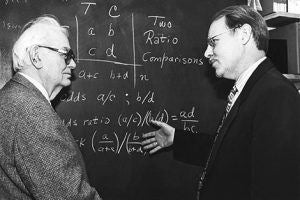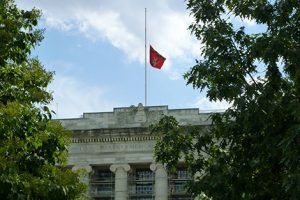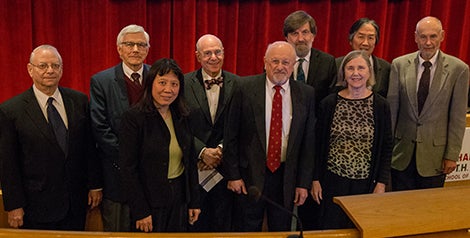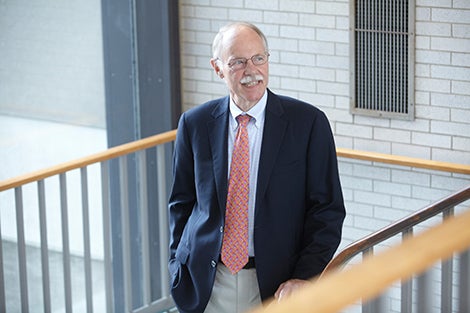April 28, 2016 — James H. Ware, the Frederick Mosteller Professor of Biostatistics and Associate Dean for Clinical and Translational Science at the Harvard Chan School, passed away April 26 after a long battle with cancer.
Ware was a deeply respected and admired member of the Harvard Chan School community for nearly 40 years. Colleagues described him as a brilliant statistician, a committed mentor to students, and a truly caring person whose words “always came with a smile.”
Ware joined the faculty in 1979 after receiving his PhD in statistics from Stanford University and spending eight years as mathematical statistician at the National Heart, Lung, and Blood Institute. He was Dean for Academic Affairs at the School from 1990 to 2009, including serving as Acting Dean in 1997–1998 when then-Dean Harvey Fineberg took the position of Provost of Harvard University. As Academic Dean under Deans Fineberg and Barry Bloom, Ware had a deep and significant effect on shaping the School’s academic and research vision—a legacy upon which the School of today is built.
“Jim shaped contemporary professional education in public health,” said Fineberg, who is now President, Gordon and Betty Moore Foundation. “I had the privilege of working closely with Jim on a daily basis. He was unfailingly considerate, thoughtful, calm, reliable, and fair-minded, the kind of person on whom you could rely in bad times as in good.”
“As Academic Dean for 19 years, Jim set a very high standard of professionalism and concern for the welfare of the School and our faculty,” said David Hunter, who succeeded Ware in his role before taking over as Acting Dean of the School last year. “When he stepped down from the post it literally took two of us to replace him.”

Ware had a longstanding interest in studies of pulmonary and cardiovascular disease. Said Hunter, “It is no exaggeration to say that his research efforts have helped save thousands, if not millions of lives.” From 1980 to 1995, Ware was a co-investigator in the landmark Six Cities Study of Air Pollution and Health, which has had a profound effect on Clean Air Act regulations in the U.S. and efforts to limit air pollution around the world. “Jim helped us understand how air pollution modifies the growth of lungs in children and the development of respiratory and cardiovascular disease in adults,” said Douglas Dockery, chair of the Department of Environmental Health and principal investigator on the Six Cities Study. “His analyses showing that fine particle air pollution reduced life expectancy has led to measurably better air quality and better health around the world.”
Ware was internationally recognized for his publications on the design and analysis of longitudinal and multi-level physiologic, clinical, and biological studies and on methodologic issues in clinical trials research. He co-authored a 1982 paper in Biometrics titled “Random Effects Models for Longitudinal Data” that is often cited as a classic in the biostatistics field and still provides the standard approach used to analyze longitudinal and repeated measures data, not only in the medical and public health field but in many other applied sciences as well, according to Nan Laird, Harvey V. Fineberg Research Professor of Public Health and a friend and colleague for over three decades who was a co-author. “The paper provided an easily implemented method for doing important substantive analyses in a context where previous methods were either too complex or simple,” she said.
He served as a statistical consultant to the New England Journal of Medicine (NEJM) for more than 20 years. He was senior statistician for randomized trials of strategies for protecting the brain during surgical repair of transposition of the great arteries in infants, chelation therapy for lead-exposed children and, more recently, research examining vitamin D supplementation to prevent development of diabetes and the role of sleep apnea in diabetes. “He always asked the key questions, often pushing us to address the crucial issues, not just the statistical details,” said Jeffrey M. Drazen, Editor-in Chief, NEJM.
After concluding his service as Dean for Academic Affairs, he returned to research and teaching. Between 2008 and 2011, he served as Director of the Biostatistics Program at the Harvard Center for Clinical and Translational Science. Since 2011, he served as Associate Dean for Clinical and Translational Research for the Center. He taught clinical trials research methods (BIO214) for many years at the School and was involved in the development of master’s degree programs in epidemiology and biostatistics with international partners in Cyprus and Saudi Arabia.
Ware had a great dedication to helping students, both undergraduates and graduate students—literally taking his work home with him between 1996–2003 when he and his wife Janice Ware served as Masters of Cabot House at Harvard College.

“Jim Ware, in the most profound sense, was a ‘good person,’ and one of the nicest human beings on the planet. As a teacher, he was totally dedicated to his students—he loved them and they loved him,” said Bloom, Harvard University Distinguished Service Professor and Joan L. and Julius H. Jacobson Professor of Public Health.
Ware “will always be remembered as a man of uncommon brilliance, dignity, class, and grace,” said Howard Koh, Harvey V. Fineberg Professor of the Practice of Public Health Leadership.
“Through his research, scholarly reviews, teaching, and mentoring, Jim Ware has contributed enormously to the enhancement of public health and the quality of biomedical research worldwide,” said Walter Willett, Frederick John Stare Professor of Epidemiology and Nutrition and chair of the Department of Nutrition.
“The model Jim provided for us over the last months of his life is one I will always aspire to. He was optimistic, enthusiastic about life, not afraid or depressed and above all mindful of the precious nature of his relationships with others,” said Laird.
In addition to his wife Janice, Ware is survived by his daughter Cameron Ware, his son Jake Ware, Jake’s wife Siu Ping Chin Feman, and Jim’s sister Elaine Mansfield.
Symposium celebrates Ware’s life
A symposium in celebration of Ware’s life and career was held at the School on Friday, April 29, featuring tributes from nine of Ware’s colleagues and friends. A video aired at the celebration featuring highlights from a series of conversations between Ware and colleagues at Harvard Chan School:

A memorial service for Ware will be held at a later date.
— photo of James Ware by Kent Dayton
— photo of James Ware and Frederick Mosteller by Barbara Steiner, courtesy Harvard Medical School
— video by Shaina Andelman
— photo of speakers at James Ware Symposium by Sarah Sholes
This article was updated on May 2, 2016.
